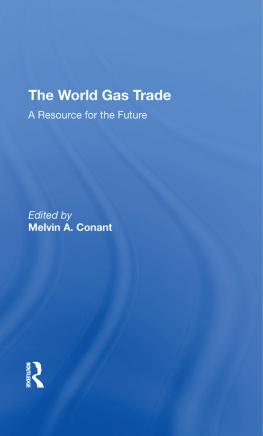About the Book and Editor
The proximity of vast reserves of natural gas to the great energy-consuming markets of the world, the relative environmental harmlessness of gas, and its competitive price make the use of gas increasingly attractive to an energy-hungry world. Within the next two decades we will see the use of gas and gas-related technologies expand in industrialized nations as well as among developing countries.
An international group of authorities on the political economy of natural gas analyzes the key factors influencing present gas supplies and uses and looks to the future, when new logistic systems and technological advances will affect both producers and consumers. The basic political, economic, and security considerations of energy will undergo a concomitant change in response to the increased availability and affordability of gas. In most markets, government monopolies direct the gas trade; in North America there will be a renewed role for private enterprise. Japan may also find its position greatly altered; although there are at present no pipeline connections to suppliers, and Japan is currently dependent on far-away sources of liquified natural gas, the contributors predict that future gas links to East Asia are highly likely.
The World Gas Trade explores the growing gas trade, anticipating that within the next several decades the foundation will have been laid for gas-fueled economies to displace oil-based economies in the world system.
Melvin A. Conant is president of Conant and Associates, Ltd., in Washington, D.C., and publisher of the international monthly Geopolitics of Energy . He is the editor (with commentary) of Oil Strategy and Politics, 19411981 (Westview, 1982), the selected papers of Walter J. Levy.
Dedicated to Theresa G. McConnell whose good spirits and unstinting efforts have made so much possible
First published 1986 by Westview Press
Published 2019 by Routledge
52 Vanderbilt Avenue, New York, NY 10017
2 Park Square, Milton Park, Abingdon, Oxon OX14 4RN
Routledge is an imprint of the Taylor & Francis Group, an informa business
Copyright 1986 by Taylor & Francis
All rights reserved. No part of this book may be reprinted or reproduced or utilised in any form or by any electronic, mechanical, or other means, now known or hereafter invented, including photocopying and recording, or in any information storage or retrieval system, without permission in writing from the publishers.
Notice:
Product or corporate names may be trademarks or registered trademarks, and are used only for identification and explanation without intent to infringe.
Library of Congress Cataloging-in-Publication Data
The world gas trade.
(Westview special studies in natural resources and
energy management)
Bibliography: p.
Contents: Overview / Melvin A. Conant --International
gas trade / Jonathan P. Stern --International
gas contracts / Gerald B. Greenwald--[etc.]
1. Gas industry--Addresses, essays, lectures.
I. Conant, Melvin. II. Series.
HD9581.A2W67 1986 382.42285 86-1711
ISBN 13: 978-0-367-27384-2 (hbk)
Contents
,
Melvin A. Conant
The origin of natural gas LNG LPG location and size of reserves world gas demand North America Europe pipelines
,
Jonathan P. Stern
Western Europe : domestic and imported requirements political, economic and security factors (Soviet and other suppliers)
Asia-Pacific : Crucial importance of Japan and LNG issues of source and price competitiveness renegotiations further diversification of supplies: Middle East Southeast Asia Australia North America Soviet Far East
North America : U.S. natural gas market revolution Canadas supply Mexico LNG short-term market forces vs long-term investment commitments
Future Gas Trades : additional volumes from the Arctic Norway U.S.S.R. Middle East issues in contracts to meet market conditions state intervention
,
Gerald B. Greenwald
History of commercialization of gas (natural and LNG) logistics economics political elements uniqueness of U.S., Europe and Japanese markets long-term gas contracts structure of contracts quantity take-or-pay impact of volatile markets contract termination price revisions hardship clauses renegotiations new directions incentive pricing take-or-pay ceilings spot sales requirements joint ventures
,
Simon A. Blakey
Background and structure British and Continental experiences gas: a derivative industry roles of government in industry operations relationships between industries links and cooperation different structure from the U.S.
European gas demand: residential/commercial electrical power generation chemical industries surplus supplies logistics constraints government energy policies oil competition: price and oil companies gas pricing principles and practices Netherlands Algeria Norway Soviet Union level of prices political limits differences in U.S. and European views security and transmission gas in larger context of international relations
,
Janne Haaland Matlary
Norwegian shelf resources markets: United Kingdom and the Continent Germany political factor in German-Soviet relations France Belgium Italy security of supply: the Norwegian interest role of Norwegian gas in future West European demand Norwegian trade and gas policies factor of time and competition in Norways gas future
,
Balint Balkay and Sandor Sipos
Gas growth in Eastern Europe reserves production exploration self-sufficiency? consumption patterns imports from U.S.S.R. pipelines joint construction projects: contractual and financial aspects gas pricing and prices
Natural gas in the U.S.S.R. reserves development production achievements role of Western Siberia: progress and problems Soviet internal gas supply system investments infrastructure issues in coordination of assignments and performance vital importance of energy progress: critiques of First Secretary M.S. Gorbachev technology
U.S.S.R. exports to West Europe question of reliable supply price competitiveness of Soviet gas prospects for gas inside U.S.S.R. and for export
,
Toyoaki Ikuta and Norio Tanaka
History of LNG growth in Japanese market sectoral demand for gas government policy utilities views competitiveness of gas role of coal and nuclear power
Forecast of gas supply-demand to 1990 and after supply accounted for problems in LNG pricing essential to curb costs of LNG projects
,
Daniel E. Gibson and Mason Willrich
California gas market role of Pacific Gas and Electric sources of supply and demand gas strategy Alberta-California Pipeline experience of natural gas shortage and need for Canadian supply issues of price and regulation U.S. regulatory response Canadian gas contracts method of pricing and prices Canadian response in competition for gas market
,
Arnold J. Lowenstein and Shane S. Streifel
Gas history to 1984 supplies to U.S. market logistics effect of changes in U.S. market and gas import policies
Canadian reserves domestic demand export record changes in U.S. gas regulations (1978) Canadian gas becomes non-competitive changes since 1983 in U.S. gas market regulations question of price competition
Structure of Canadas gas industry companies logistics regulation and pricing change in Canadian domestic and export policies and practices deregulation: the New Agreement of 1985 on pricing and taxation domestic sales exports implications of deregulation
,











